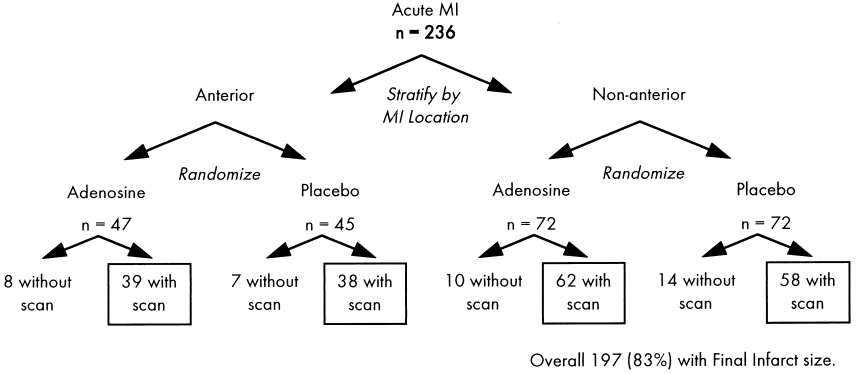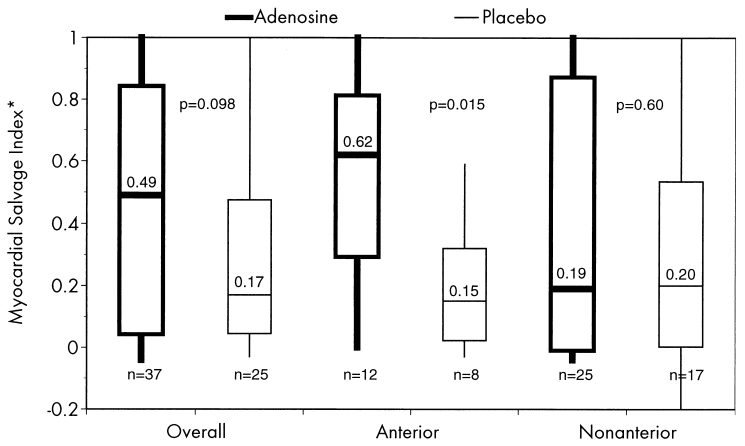
May 16, 2023 / Author: China Glutathione suppliers & NMN manufacturers
Reperfusion therapy for acute myocardial infarction has been shown to reduce mortality, but reperfusion itself may have deleterious effects. The Acute Myocardial Infarction Adenosine Trial (AMISTAD) was designed to test the hypothesis that adenosine, as an adjunct to thrombolysis, can reduce myocardial infarct size. The AMISTAD trial, a prospective, open-label trial of thrombolytic therapy, randomized 236 patients to adenosine or placebo within 6 hours of infarction. The primary endpoint was infarct size determined by Tc-99m single-photon emission computed tomography (SPECT) imaging within 7 days of enrollment according to a multivariable regression model to adjust for covariates. Secondary endpoints were a composite of myocardial salvage index and in-hospital clinical outcomes (death, reinfarction, shock, congestive heart failure, or stroke).
Patients were recruited between 1994 and 1997 at 19 centers in the United States, Argentina, and Canada. Eligible patients were stratified by location of myocardial infarction (anterior or non-anterior as assessed by the field investigator) and then randomized to adenosine (70 µg/kg/min intravenous infusion over 3 h) or placebo (Intravenous infusion of normal saline at a rate of 70 µg/kg/min for 3 hours). The primary endpoint was myocardial salvage index as determined by SPECT myocardial perfusion imaging. If side effects occur during the operation, the infusion rate of adenosine is gradually reduced by 10ug/kg/min. After elimination of any side effects, the infusion rate should be increased in increments of 10 ug/kg/min to the maximum tolerated dose, but not to exceed 70 ug/kg/min. Other cardiac medications, diagnostic procedures, intercardiac veins, or revascularization procedures are at the discretion of the physician. Final infarct size will be determined from Tc-99m SPECT images performed 6±1 days after admission. Inpatient follow-up or telephone follow-up four to six weeks after discharge.
Research result:

A total of 236 AMI patients were enrolled and divided into anterior wall group (47 cases in adenosine group and 45 cases in placebo group) and non-anterior wall group (72 cases in adenosine group and 72 cases in placebo group) according to the location of myocardial infarction. Baseline clinical and historical characteristics were similar in the two groups, with similar median infusion times.
For all patients, the relative reduction in final postoperative infarct size was 33% in the adenosine group compared with the placebo group (P=0.085). But for patients with anterior wall myocardial infarction, compared with the placebo group, the final infarct size in the adenosine group was reduced by 67% (P=0.014), and the myocardial salvage index was significantly improved (0.62 vs 0.15, P=0.015). However, in patients with non-anterior myocardial infarction, no reduction in final infarct size was observed (11.5 vs 15.5), and the results for myocardium at risk and myocardial salvage index were similar.


The main finding of this study was that a 3-hour intravenous infusion of adenosine during thrombolysis in patients with acute myocardial infarction significantly reduced infarct size. Among patients with anterior myocardial infarction, adenosine-treated patients had a significant 67% reduction in infarct size compared with placebo (P = 0.014). No reduction in infarct size was observed in patients with nonanterior myocardial infarction. Although left ventricular infarct size was reduced in the adenosine group, in-hospital clinical outcomes were similar between the two groups.
Adenosine, as a coronary vasodilator, is widely used as a safe pharmacological stress drug for the detection of coronary artery disease. In the current study, the incidence of bradycardia, hypotension, and atrioventricular block was relatively low, but the incidence of bradycardia tended to be higher in patients with non-pre-myocardial infarction, which may be due to the High vagal tone. Despite these concerns, in this study, patients with acute myocardial infarction treated with adenosine had a significant reduction in infarct size. In theory, targeting of more specific adenosine receptor subtypes may be beneficial in maintaining cardioprotection while limiting potential side effects.
Supplier Introduction: China glutathione supplier and NMN manufacturer GSHworld, the company mainly develops biotechnology and industrialization. As a global pioneer in enzymatic catalytic ATP regeneration technology, our company advocates green production and is committed to providing customers with better and more environmentally friendly products and services. Glutathione Manufacturer,NMN Factory,Citicoline Sodium supplier,China NMN manufacturers
+86-755-23577295
+86 18718790084
Room 832, Building 12, Shenzhen Bay Science and Technology Ecological Park, Yuehai Street, Nanshan District, Shenzhen China